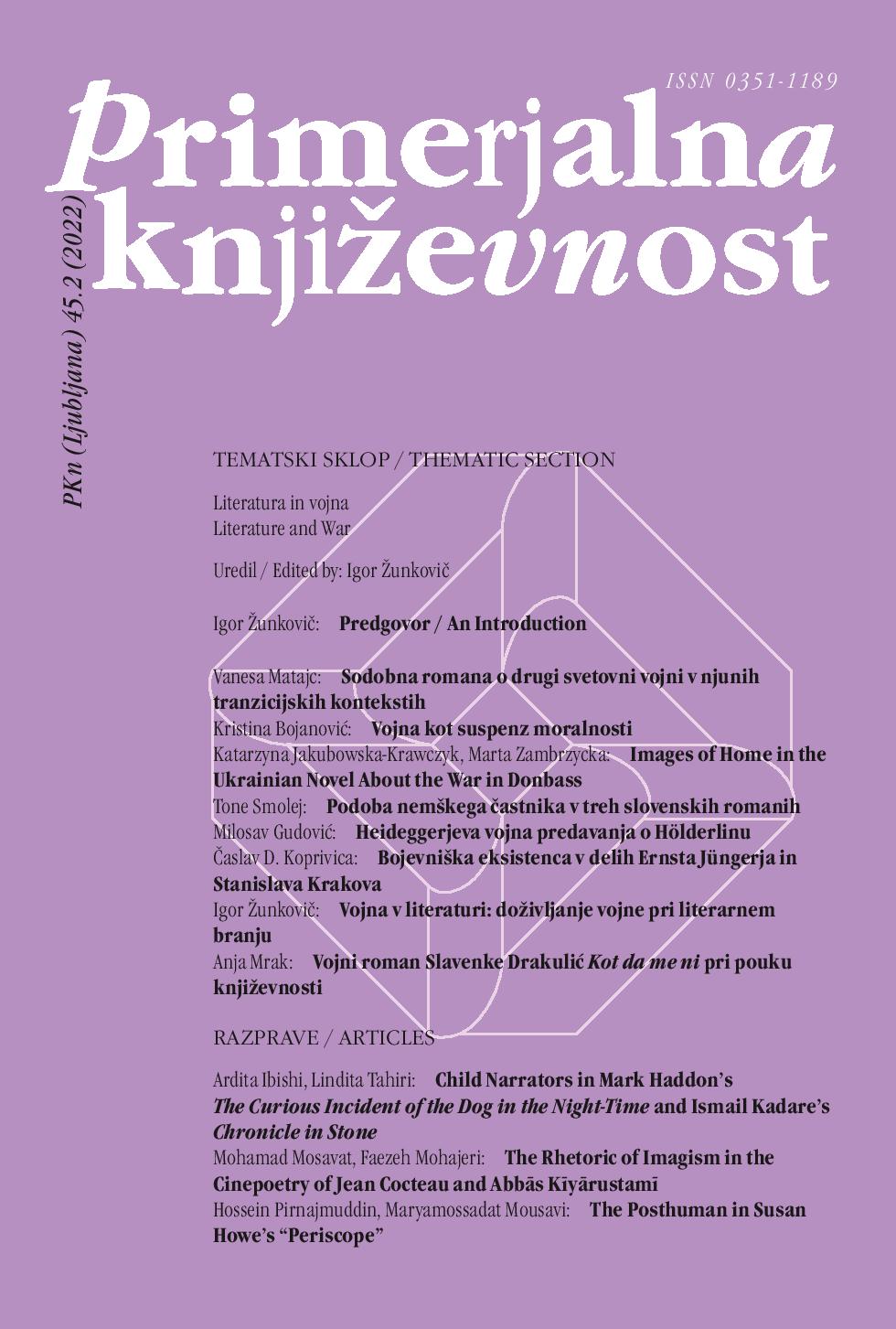Comparative Analysis of the Mind Style: Child Narrators in Mark Haddon’s The Curious Incident of the Dog in the Night-Time and Ismail Kadare’s Chronicle in Stone
DOI:
https://doi.org/10.3986/pkn.v45.i2.09Keywords:
narratology, English literature, Albanian literature, Haddon, Mark, Kadare, Ismail, narrative strategy, child narrator, linguistic patternsAbstract
This study compares the stylistic markers of the thinking style of the child narrators in The Curious Incident of the Dog in the Night-Time (2003) by British writer Mark Haddon and Chronicle in Stone (1971) by Albanian writer Ismail Kadare. The paper analyzes the language of the narrators to identify the foregrounded linguistic elements in the narrative and consequently their reliability and impact on the reader. The linguistic features that characterize the child narrators of these novels are considered as features of their thinking style that indicate the limitations of their age and create the effect of unreliability. The analysis of the narrators’ stylistic features points to the foregrounded patterns that differ slightly in both narrators and are demonstrated at different linguistic levels such as lexical choices, coordinated syntactic patterns, juxtapositions of literal and figurative meanings, and the inclusion of other elements that mark the distinction of their idiosyncrasies and social background. By reflecting the child’s genuine naiveté, the narrative device of unreliability evokes empathy and enhances the reader’s interpretive power.
References
Bakhtin, Mikhail M. <em>The Dialogic Imagination</em>. Ed. Michael Holoquist. Trans. Caryl Emerson and Michael Holoquist. Austin, TX: University of Texas Press, 1981.
Bellos, David. “Introduction.” <em>Chronicle in Stone</em>. Author Ismail Kadare. Melbourne: Text Publishing Company, 2008. 10–13.
Booth, C. Wayne. <em>The Rhetoric of Fiction</em>. Chicago, IL: University of Chicago Press, 1983.
Chew, Kristina. “Fractionated Idiom Metonymy and the Language of Autism.” <em>Autism and Representation</em>. Ed. Mark Osteen. New York, NY: Routledge, 2008. 133–144.
Childs, Peter, and Roger Fowler. <em>The Routledge Dictionary of Literary Terms</em>. New York, NY: Routledge, 2006.
Cohn, Dorrit. <em>The Distinction of Fiction</em>. Baltimore, MD: John Hopkins University Press, 1999.
Elsie, Robert. “Subtle Dissent of a Balkan Bard: The Life and Works of Ismail Kadare.” <em>The Times Literary Supplement</em>, 24 June 2005. 14–15.
Fludernik, Monika. <em>An Introduction to Narratology</em>. London; New York, NY: Routledge, 2009.
Fludernik, Monika. “Introduction: Second-Person Narrative and Related Issues.” <em>Style</em> 28.3 (1994): 281–311.
Fowler, Roger. <em>Linguistics & the Novel</em>. London; New York, NY: Routledge, 1977.
Fowler, Roger. <em>Linguistic Criticism</em>. Oxford: Oxford University Press, 1986.
Genette, Gérard. <em>Narrative Discourse: An Essay in Method</em>. Trans. Jane E. Lewin. New York, NY: Cornell University Press, 1980.
Haddon, Mark. <em>The Curious Incident of the Dog in the Night-Time</em>. London: Jonathan Cape, 2003.
Halliday, Michael, and Ruqaiya Hasan. <em>Cohesion in English</em>. London: Longman, 1976.
Halliday, Michael, and Christian M. I. M. Matthiessen. <em>Halliday’s Introduction to Functional Grammar</em>. Rev. ed. New York, NY: Routledge, 1985.
Hogan, Patrick C. <em>Narrative Discourse: Authors and Narrators in Literature, Film, and Art</em>. Columbus: Thomson-Shore, Inc. 2013.
Holcombe, Garan. “The Curious Incident of the Dog in the Night-Time.” <em>The Literary Encyclopedia</em>, 15 September 2006. Web. https://www.litencyc.com/php/sworks.php?rec=true&UID=16877.
Kadare, Ismail. <em>Kronikë në gur</em>. 1971. Tirana: Onufri, 2015.
Kadare, Ismail. <em>Chronicle in Stone</em>. Transl. Arshi Pipa. 1987. Melbourne: Text Publishing Company, 2008.
Leech, Geoffrey, and Mick Short. <em>Style in Fiction: A Linguistic Introduction to English Fictional Prose</em>. 2nd ed. Harlow: Pearson Education Limited, 2007.
Matz, Jesse. <em>The Modern Novel: A Short Introduction</em>. Oxford: Blackwell Publishing, 2004.
Morgan, Peter. “Ismail Kadare: Writing Under Dictatorship.” <em>Arts: The Proceedings of the Sydney University Arts Association</em> 32 (2010): 69–88.
Nünning, Ansgar. “But Why Will You Say That I Am Mad? On the Theory, History, and Signals of Unreliable Narration in British Fiction.” <em>AAA: Arbeiten Aus Anglistik and Amerikanistik</em> 22.1 (1997): 83–105.
Pipa, Arshi. “Subversion vs. Conformism: The Kadare phenomenon.” <em>Telos</em> 73 (1987): 47–77.
Ray, Sarah Jaquette “Normalcy, Knowledge, and Nature in Mark Haddon’s <em>The Curious Incident of the Dog in the Night-Time</em>.” <em>Disability Studies Quarterly</em> 33.3 (2013). Web.
Semino, Elena. “Mind Style 25 Years On.” <em>Style</em> 41 (2007): 153–203.
Semino, Elena. “Language, Mind and Autism in Mark Haddon’s <em>The Curious Incident of the Dog in the Night-Time</em>.” <em>Linguistics and Literary Studies</em>. Ed. Monika Fludernik and Daniel Jacob. Berlin; Boston, MA: de Gruyter, 2014. 279–303.
Semino, Elena, and Kate Swindlehurst. “Metaphor and Mind Style in Ken Kesey’s <em>One Flew Over the Cuckoo’s Nest</em>.” <em>Style</em> 30 (1996): 143–166.
Sternberg, Meir. <em>Expositional Modes and Temporal Ordering in Fiction</em>. Baltimore, MD; London: Johns Hopkins University Press, 1982.
Updike, John. “Chronicles and Processions.” <em>The New Yorker</em>, 14 March 1988. 111–116.
Yacobi, Tamar. “Package Deals in Fictional Narrative: The Case of the Narrator’s (Un)Reliability.” <em>Contemporary Narratology</em> 9.2 (2001): 223–229.
Wales, Katie. <em>A Dictionary of Stylistics</em>. 3rd ed. New York, NY: Routledge, 2011.
Zerweck, Bruno. “Historicizing Unreliable Narration: Unreliability and Cultural Discourse in Narrative Fiction.” <em>Style</em> 35 (2001): 151–178.


